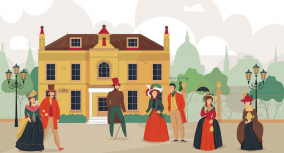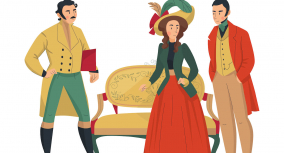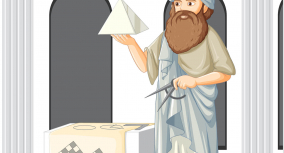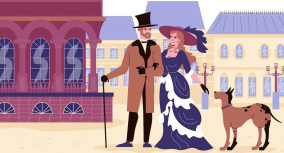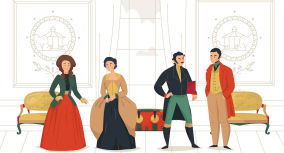Candide was written when people were not ready to hear it. Voltaire chose the genre of satire for this very reason. But nowadays, it is still understandable and topical in some aspects.
If you’re looking for Candide questions and answers, you’re in the right place! This section prepared by Custom-Writing.org experts contains a collection of answers to the most frequently asked questions related to Candide and its author, Voltaire. Some of them focus on the protagonist’s destiny since it was unpredictable and troublous. Other questions highlight the historical meaning of the novella and its influence on the French and American revolutions. You will also learn a lot about Voltaire’s role as an Enlightenment writer and the unique features of his philosophy.
- What was the significance of Voltaire’s novel, Candide?
Several aspects make Candide the essential novel of the Enlightenment. First, it depicted the absurd nature of our world two centuries before the 20th-century writers would do the same. He explained the civilizing and elevating influence of work. Third, the book reveals the bad qualities of society. - What would be a good representation of Enlightenment principles?
Imagine a botanist who dedicates himself to nature to help a dying plant. He is not interested in planting many new flowers. His main concern is to prevent the withering of a single specimen. If the reasons for its sickness are established, the other plants will be less likely to wither in the same way. This situation describes the Enlightenment principles in the best way. - Who wrote Candide?
François Marie Arouet is the name given to the famous writer at baptism, and Voltaire is a pseudonym. He was born in 1694 in Paris, in the family of a poor but intelligent official. The father ensured good education for his son, but the future philosopher was not impressed with the Jesuit College. The prospect of a legal career did not inspire him either. He decided to take up literature. - What does Candide mean?
Candide is a male name of Ancient Roman origin. Its literal meaning is “white” or “pure.” Figuratively, it means “sincere,” “naive,” or “simple-hearted.” Voltaire named his character so because he wanted to highlight his simplicity and lack of inner meaning. Candide has no ideas of his own, and everything he believes comes from other characters.
- Why did Voltaire write Candide?
Candide was the culmination of Voltaire’s work. The impetus for its creation was the famous Lisbon earthquake on November 1, 1755, when the flourishing city was destroyed, and many people died. This event renewed the controversy surrounding Gottfried Leibniz. The German philosopher claimed that humanity lived in the best of all possible worlds. - When does Candide take place?
Candide takes place in real and fictional locations of Europe and Latin America. There are no indications of the historical period in the novella. However, Chapter 5 describes the earthquake in Lisbon that took place in 1755. The action lasts during almost all of Candide’s lifetime. That is why the setting of the story is in the mid-18th century. - Why is Candide sentenced to run the gauntlet?
The sentence to run the gauntlet was a punishment for Candide’s desertion. The protagonist chose this penalty because the other variant was to be shot to death. Thus, he had to run among the military men thirty-six times while they whipped him. He endured the running only twice. - What is Candide about?
The novella is about a naïve young man who wanders the world. He starts off believing that he lives on the best of the planets. But everything he sees and everyone he meets tells a story of poverty, hardships, and abuse. In the end, he settles on a farm and dedicates himself to hard work, as it is the only method to make life tolerable. - How long is Candide?
Candide is a long novella or a short novel that has about 36,000 words. You can read it in two hours or listen to an audio version in four hours. The book’s uncommon length caused many-year scholarly debates on its genre. Still, most people agree that it is a novella. - What philosophy does Pangloss teach Candide?
Pangloss taught Candide in the Baron’s castle. He was a philosopher whose beliefs were limited to optimism in every aspect of life. He thought that humans lived in the best possible world. In particular, every event was for the better, even the most horrible or deplorable one. - How does Candide become a soldier in the Bulgarian army?
Candide’s adventures and misfortunes begin when he is expelled from the castle for his kiss with Cunégonde, the Baron’s beautiful daughter. In order not to starve to death, Candide is recruited into the Bulgarian army. There he is beaten ruthlessly for a desertion attempt. Later, he barely escapes death in a bloody battle and runs to Holland.
- Why was Voltaire exiled and sent to prison?
Voltaire was twice imprisoned during his lifetime. The second time, he was released on the condition that he would leave the country. Voltaire’s prison terms and exile were the results of his satire, which got him into trouble since he was a young man. - How did Rousseau differ from Voltaire?
The easiest way to differentiate one personality from another is the same thing we do with our fellow Americans. Rousseau is a Republican and Voltaire is a Democrat. Both of them drew inspiration from the philosophy of John Locke. But Rousseau focused on emotions, while Voltaire gave the principal importance to reason. - How did Enlightenment philosopher Voltaire influence French government?
Voltaire was an ardent advocate of the freedom of speech. He criticized aristocracy, clergy, and the government. He stood for tolerance, reason, and limited government or an enlightened monarch. In a word, he pushed for social reformation in all its forms, leading to a more educated, tolerant, and cultured society. - How did Voltaire influence the American Revolution?
Voltaire rebelled against the Church and most state institutions (aristocracy, monarchy, and bureaucrats). He advocated for social reform and equality. His writings gave the American Revolution and the Founding Fathers critical concepts to build a new form of government. Voltaire’s ideas inspired many statements of the first American Constitution. - Which statement best characterizes the ideas of Voltaire?
Voltaire’s philosophy is too multilateral to be described in a single sentence. But his principal postulate was that the government should be separate from religion. He was a Deist, meaning that he believed in God but thought that He was not interested in human problems. Thus, there was no point in the numerous clergy members, churches, and religious persecution.

